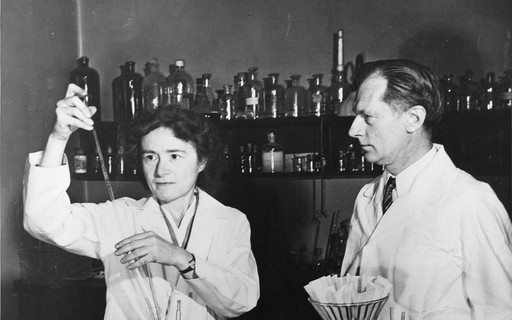Gerti Currie, the first woman to win the Nobel Prize in Medicine or Physiology (Photo: Wikimedia Commons)
Created from the posthumous wish of Swedish inventor and chemist Alfred Nobel, the famous Nobel Prize was awarded the first Laureate Prize in 1901. Some of the most important categories of prize in science were predetermined in the will of its creator: medicine, chemistry, physics, literature and peace. Since then, more than 900 people have been honored with the award, 224 of them in the medicine or physiology category. But of those, only 12 (or 5.4%) are women.
This disparity intrigued researchers Fernanda Wingrover, 25, and Ana Maria Garcia Cardoso, 30. Wengrover is in his sixth year of medicine at the Federal University of Health Sciences of Porto Alegre (UFCSPA), and Cardoso is a residency in general surgery at the Pontifical Catholic University of Rio Grande do Sul (PUCRS). After reading an article about Brazilian gastroenterologist Angelita Haber Gama – recognized by Stanford University, in the US, for being among the 2% of the world’s most famous scientists – Fernanda and Anna decided to search for Nobel Prize winners in medicine.
Although Marie Curie is one of the prize’s most notable winners—she won the Nobel Prize in Physics in 1903 and the Nobel Prize in Chemistry in 1911—Brazilian women wanted to know the other outstanding women of the prize. The results are frustrating. There are no scientific articles talking about Nobel Prize winners in medicine or physiology. It doesn’t exist,” Anna Cardoso laments, unlike Marie Curie, who has plenty of content and even a movie on Netflix. “

American researcher Barbara McClintock (Photo: Wikimedia Commons)
the study 12 women have won the Nobel Prize in Medicine or Physiology It was published in December 2021 in the scientific journal Medicine. Under the guidance of surgeon Marcelo Garcia de Tonto, MD, professor at PUCRS College of Medicine, they investigated who these women were and how they marked their accomplishments. For this purpose, they consulted the Nobel Prize website and Books by Women Nobel Prize Laureates in Science (Ground Zero, 2008), by Sharon Birchk McGrain, and Nobel: Prize and Men’s Prize – Nobel in Physiology and Medicine (JSN, 1999), by Joao J. Noro. “We hope this research will inspire girls who dream of pursuing scientific careers,” says Anna Cardoso.
Unequal recognition
The first woman to win the Nobel Prize in Medicine or Physiology was awarded just 46 years after the award was established. In 1947, American biochemist Gertie Curie was the first woman to be honored in this category, sharing that honor with two other men. One of them was her husband, Carl Ferdinand Curie, with whom she developed research into the glycogen catalytic conversion pathway, which was essential to a better understanding of diabetes.
The first and only woman to win the Laureate Prize without sharing it with other scientists in this category was awarded the Curie Prize only 36 years later. In 1983, Barbara McClintock was recognized for her studies of mobile genetic elements called transposons, which are “jumping” genes that transpose the genome and are able to move and reproduce in fragments of DNA.
Who are the other winners?

Italian neurologist Rita Levi-Montalcini was awarded the Laureate Prize in 1986 (Photo: Wikimedia Commons)
Between Cori (1947) and McClintock (1983), only one woman was awarded. In 1977, American physicist and physician Rosalynn Yalow won the prize along with Roger Guillemin and Andrew Shaley. Yalow was responsible for developing a technique used to determine hormone concentrations called radioimmunoassay.
After McClintock, nine women have won the Nobel Prize in Medicine or Physiology. Italian neurologist Rita Levi-Montalcini was awarded the Laureate Prize in 1986 for her findings on growth factors. Two years later, in 1988, Gertrude B. Eleon for her study of the important principles of substance abuse treatment. In 1995, the role of Christian Nosslen Vollhard was in honor of her discoveries about the genetic control of embryonic development.
After the turn of the century, Linda B. Buck is the first woman to receive the award. In 2004, she was awarded the Nobel Prize for her research in the field of odor receptors and regulation of the olfactory system. Four years later, in 2008, French virologist Françoise Barry-Sinoussi received an honor for her contribution to the discovery of the human immunodeficiency virus (HIV).
So far, 2009 was the only year that two women won a laureate in this category. Biologists Carol W. Greider and Elizabeth H. Blackburn were selected for their joint discovery of telomerase and how chromosomes are protected by telomeres. the brain. The last woman to receive the award was Chinese pharmacologist Tu Youyou. In 2015, she was honored for her findings on a new treatment for malaria.

The last woman to be awarded the Nobel Prize in Medicine or Physiology was Chinese pharmacologist Tu Youyou. (Photo: Wikimedia Commons)
several days
The fact that caught the attention during the study was the number of laureates who had children. And of the 12 awards, six weren’t mothers. German Kristian Neslen-Volhardt Laureate in 1995 and a biology graduate from the University of Frankfurt, is among the childless winners.
Although she is not a mother, in 2004 she created a foundation that bears her name and aims specifically to support research mothers who have a double journey: work and motherhood. For example, Chinese Tou YouYou had to give up raising her two children to finish her research. For the authors, more studies are needed to investigate the effect of motherhood on women’s scientific output.
* Supervised and edited by Luisa Monteiro and Larissa Lopez.

“Hardcore beer fanatic. Falls down a lot. Professional coffee fan. Music ninja.”






More Stories
The law allows children and adolescents to visit parents in the hospital.
Scientists pave the way for the emergence of a new element in the periodic table | World and Science
Can dengue cause hair loss? Expert explains how the disease affects hair